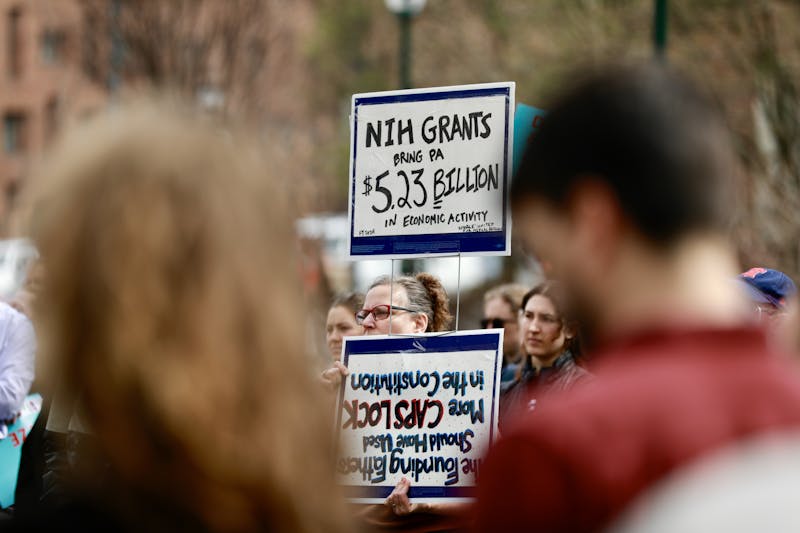A girl was just shot. And we wonder where we are. "The bottom line is nothing has really changed," said 1998 graduate James McCormack in a recent Daily Pennsylvanian article.
He was referring to last Sunday's shootout that wounded a sophomore at 38th and Sansom streets. McCormack was also wounded once, when a man demanding his keys shot him in the stomach near campus in 1997.
"I'd almost bet 10 grand [that] every time there's a serious crime on campus, Penn's response is, 'Penn has done this, we've increased security,'" McCormack added.
For McCormack, then, Sunday's shooting demonstrated that the streets remain unsafe. Here is a man who has seen campus violence before and recognizes it again. A man who was literally shot in the viscera, he needs only visceral evidence to confirm his worst suspicions about our vulnerability. It doesn't matter that McCormack's junior year here saw 100 percent more robberies and overall crimes than occurred in 2004, according to the Division of Public Safety.
Which raises an interesting question: Do statistics matter in the here and now? The numbers say we're safe -- and the Division of Public Safety loves quoting numbers -- but a Christmas Day murder in Philly Diner says otherwise.
Similarly, the guards charged with protecting our buildings may not receive proper training or treatment, according to several AlliedBarton employees. But Executive Vice President Craig Carnaroli has spent the last three-and-a-half months crunching numbers and according to him, things are looking up.
"I can believe the anecdotes, or I can look at the data," he said. "You say the data's flawed and the anecdotes are real. Well, I put more stock in data."
The numbers Carnaroli gave me indicate the company plays fair. In a survey answered by 347 of Penn's 365 Allied guards, 94 percent of guards said they received sufficient on-the-job training and 93.6 percent said they were happy in their jobs. Allied's turnover rate at Penn is 47 percent, compared with 200 percent for security companies at similar universities.
The average Penn guard receives $10.90 in compensation per hour, higher than the average for guards elsewhere in Philadelphia and the Ivy League. Meanwhile, Allied is spending $2 million per year on debit accounts to help its employees avoid check-cashing fees.
And with guards struggling to pay the rising costs of health insurance, Allied offers USNow, a cheaper, limited benefit program designed by Continental Insurance to help workers afford coverage.
Of course, the anecdotes tell another story, a story the data vehemently deny.
One security guard I spoke to, whose contract forbids media interviews, told me healthcare was no longer an option for her three kids after it rose from $4,888 per year to $5,928. This guard makes about $9.50 an hour, even after a decade of employment at Allied and SpectaGuard.
"I had to stop getting the health insurance," the guard said, "even though one daughter is asthmatic and needs medication. It just became too much."
Another guard with more than five years at Allied told me about training: "One day, I'm sitting at my desk, and this new kid comes, and asks, 'What do I do?' He didn't even know how to swipe students' cards."
All the guards I spoke to charged certain Allied managers with nepotism, citing a case in which a man hired his entire immediate family. One guard said several female colleagues "had blown their way to management."
Carnaroli acknowledged these guards' concerns, but questioned whether they represent a general consensus among Allied employees.
"I don't wish for us to be held hostage to the opinions of the few," he said. If that sounds inconsiderate, it's not.
I spoke to Carnaroli for a long while, and he threw more numbers and analyses at me than I have room to mention. Besides surveying guards, he spoke to other Allied employees at every level, reviewed Penn's contract with Allied, analyzed Allied's grievance procedures and studied other security companies. He obviously knows what he's talking about.
And yet, numbers can never tell the whole story. Because no matter how in-depth, no matter how well-researched, they just don't convey what it means to lose health insurance. Or take a bullet to the stomach.
So the question remains: If the stats say crime used to be 100 percent worse, and the story says guards can't swipe, which do you believe?
And do you feel safer?
Gabriel Oppenheim is a College freshman from Scarsdale, N.Y. Opp-Ed appears on Fridays.
The Daily Pennsylvanian is an independent, student-run newspaper. Please consider making a donation to support the coverage that shapes the University. Your generosity ensures a future of strong journalism at Penn.
DonatePlease note All comments are eligible for publication in The Daily Pennsylvanian.







